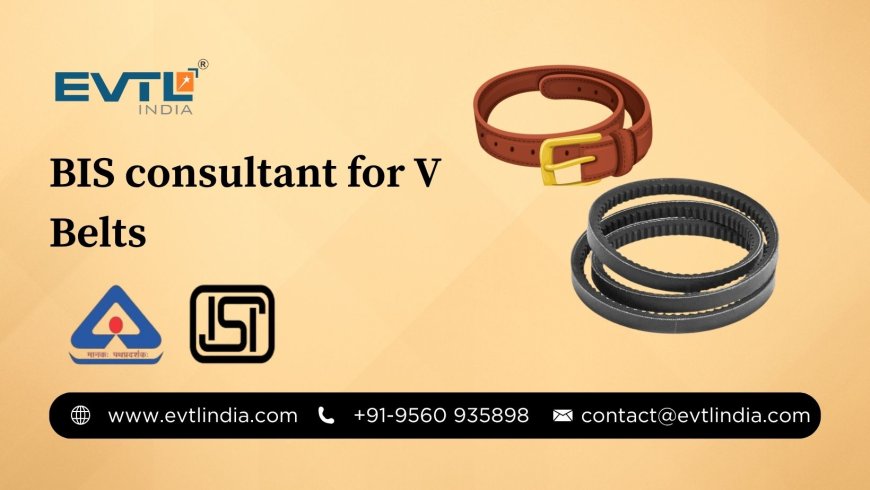A Complete Guide to BIS for V Belts: Ensuring Quality & Compliance

In todays competitive manufacturing industry, product quality and safety are of utmost importance. One such critical component used in various machines and equipment is the V Belt. Known for its robust transmission capabilities, the V Belt plays a vital role in multiple industriesfrom automotive to agriculture. But how can buyers and manufacturers ensure these V Belts meet stringent quality standards? Thats where BIS for V Belts comes in.
Bureau of Indian Standards (BIS) certification is a quality assurance mark that certifies a product meets Indian safety and performance standards. For V Belts, obtaining BIS certification is essential for manufacturers who wish to sell in the Indian market or cater to clients demanding certified products. In this blog, well dive into what BIS certification for V Belts is, why it matters, how to obtain it, and who can help you navigate the process smoothly.
What is a V Belt?
A V Belt is a mechanical belt used to transmit power between axles. Its widely used in industrial machines, engines, and pumps for its efficient power transmission and compact design. The "V" shape allows it to wedge into pulleys, reducing slippage and improving transmission efficiency.
Due to their crucial role in operations, the quality of V Belts must be consistent, reliable, and compliant with performance standards. Hence, a formal certification process like BIS is essential.
Understanding BIS Certification for V Belts
BIS certification for V Belts is a process wherein the manufacturers products are tested and verified by the Bureau of Indian Standards. If the product complies with the standards laid out in the applicable Indian Standard (such as IS 2494), the manufacturer is granted a license to use the BIS Standard Mark (ISI mark) on their V Belts.
This certification assures customers that the V Belts meet the necessary safety, durability, and performance requirements as per Indian regulations.
What is the ISI Mark and Why Its Important?
The ISI Mark for V Belts is a symbol that signifies the product complies with the standards set by BIS. The mark is mandatory for certain products in India and voluntary for others. It gives buyers confidence in the products quality and is often a requirement in B2B and government tenders.
For manufacturers, having an ISI mark is not just about complianceits about building credibility and gaining customer trust.
Which Indian Standards Apply to V Belts?
To receive ISI certification for V Belts, the manufacturer must comply with specific Indian Standards, such as:
-
IS 2494 (Part 1):2023 General requirements for V Belts
-
IS 2494 (Part 2):2023 Specifications for Classical V Belts
-
IS 2494 (Part 3):2023 Specifications for Narrow V Belts
These standards cover design specifications, material quality, testing procedures, dimensional checks, and durability benchmarks.
Who Needs BIS Certification for V Belts?
BIS certification is typically required by:
-
Domestic manufacturers who want to sell V Belts in India
-
Exporters who wish to meet Indian import standards
-
OEMs (Original Equipment Manufacturers) working with government contracts
-
Industrial equipment suppliers needing a competitive edge
The BIS Certification Process for V Belts
The BIS certification process includes several steps:
1. Application Submission
You start by applying online through the BIS portal and submitting relevant documents, including:
-
Factory registration certificate
-
Product specifications and test reports
-
Manufacturing process flow diagram
-
Details of the in-house laboratory
2. Product Testing
A sample of the V Belt is collected and sent to a BIS-recognized laboratory for testing. The lab checks if the product meets the specifications outlined in the applicable IS standard.
3. Factory Inspection
BIS officials conduct an inspection of the manufacturing facility to verify the production process, quality control mechanisms, and testing capabilities.
4. Grant of License
Once the test results and inspection reports are verified, BIS grants a license to use the ISI mark on the certified product.
How Long Does It Take?
The BIS certification process for V Belts generally takes around 3045 working days, depending on the readiness of documents, factory inspection schedules, and testing outcomes.
Costs Involved
The total cost of certification includes:
-
Application and processing fee
-
Laboratory testing fee
-
Inspection and audit charges
-
Consultant or agent charges (if applicable)
Although the cost may vary, it is a worthwhile investment that adds long-term value to your brand.
Role of a BIS Consultant for V Belts
Obtaining BIS certification can be complex and time-consuming, especially for new manufacturers. Thats why working with a BIS consultant for V Belts can be incredibly helpful. A consultant assists with:
-
End-to-end document preparation
-
Product testing coordination
-
Compliance with IS standards
-
Factory audit readiness
-
Follow-ups with BIS officials
With expert guidance, manufacturers can avoid delays and errors, ensuring faster and smoother certification.
Finding the Right ISI Consultant for V Belts
Choosing a reliable ISI consultant for V Belts can make a significant difference in how efficiently you achieve certification. A good consultant will have:
-
Extensive knowledge of BIS certification norms
-
Industry-specific expertise
-
Experience in dealing with BIS officials
-
A proven track record of successful certifications
Ensure you review testimonials, case studies, or client feedback before making a decision.
Benefits of BIS Certification for V Belt Manufacturers
Heres why BIS certification is a smart move for manufacturers:
-
Increased Market Access: Products with an ISI mark are accepted widely across India and in government tenders.
-
Higher Customer Trust: Buyers are more confident in certified products.
-
Regulatory Compliance: Avoid legal penalties and market restrictions.
-
Competitive Advantage: Stand out from non-certified competitors.
-
Export Readiness: Facilitates easier entry into other regulated markets.
Challenges and How to Overcome Them
While the benefits are clear, some challenges may include:
-
Complex documentation
-
Delays in lab testing
-
Factory not meeting standards
-
Lack of awareness of the latest BIS norms
Most of these hurdles can be effectively managed with the right preparation or with help from a trusted BIS or ISI consultant.
Conclusion
EVTL India is one of the leading BIS Consultant in India, helping manufacturers obtain their BIS licences hassle-free. Getting BIS certification for V Belts is not just a regulatory stepits a business strategy that adds value, trust, and credibility to your product. It assures your clients that your V Belts are safe, durable, and manufactured in compliance with Indian standards.
With the growing emphasis on quality assurance in both domestic and international markets, investing in ISI certification is a forward-thinking move. Whether you're a manufacturer entering the Indian market or expanding your product credibility, BIS certification opens doors to new opportunities and partnerships.

































